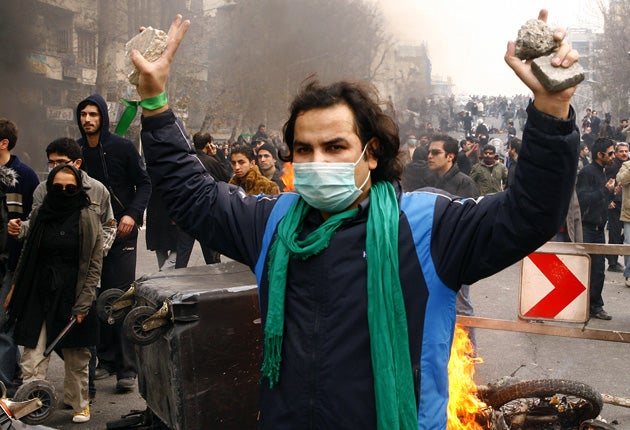Body of Mousavi's nephew taken from Tehran hospital
Seven prominent opposition members arrested following clashes that erupted at weekend

Your support helps us to tell the story
From reproductive rights to climate change to Big Tech, The Independent is on the ground when the story is developing. Whether it's investigating the financials of Elon Musk's pro-Trump PAC or producing our latest documentary, 'The A Word', which shines a light on the American women fighting for reproductive rights, we know how important it is to parse out the facts from the messaging.
At such a critical moment in US history, we need reporters on the ground. Your donation allows us to keep sending journalists to speak to both sides of the story.
The Independent is trusted by Americans across the entire political spectrum. And unlike many other quality news outlets, we choose not to lock Americans out of our reporting and analysis with paywalls. We believe quality journalism should be available to everyone, paid for by those who can afford it.
Your support makes all the difference.The body of the nephew of Iran's opposition leader – slain in the deadliest day of anti-government protests in months – disappeared from hospital yesterday, and security forces detained at least seven prominent activists, according to opposition reports.
Iranian state television said that eight people had died in Sunday's street violence, but independent confirmation of the casualty toll was virtually impossible because of curbs on media coverage. Tehran residents say restrictions on internet access were intensified, and Iranians were unable to see opposition websites. Mobile phone and text-messaging services were sporadic.
Reza Mousavi said that the body of his brother, Ali Mousavi, was taken overnight from a Tehran hospital and that nobody had accepted "responsibility" for removing the corpse. Authorities were possibly seeking to deter mourners from organising more protests around the funeral.
The killed man was the nephew of Iran's opposition leader, Mir-Hossein Mousavi, a presidential contender in a disputed election in June.
Sunday's bloodshed drew harsh condemnation from another opposition leader, who compared the current Ahmadinejad government to the dictatorship that was ousted by the Islamic Revolution three decades ago.
In an online statement, Mehdi Karroubi, another candidate in the June election, asked how the government could spill its people's blood during commemorations of Shia Islam's most important observance, Ashura. He told the opposition Rah-e-Sabz website that even the former government of the hated Shah Pahlavi, who was overthrown in 1979, respected the holy day, and described those who confronted the protesters as "savage individuals".
The government crackdown drew sharp criticism from the West, which is already locked in a dispute with Iran over its suspected efforts to develop nuclear weapons. Iran says its nuclear programme is for peaceful purposes.
The US President, Barack Obama, on holiday in Hawaii, strongly condemned what he said was the "iron fist of brutality" to quell the protests and demanded the immediate release of those who had been detained.
The Foreign Secretary, David Miliband, said it was "particularly disturbing" to hear reports of the crackdown by security forces on the sacred occasion of Ashura, and urged Iran to respect human rights. Germany's foreign minister, Guido Westerwelle, warned that "the international community will watch and not look away".
Sunday's violence erupted when security forces fired on stone-throwing protesters in the centre of Tehran. Opposition activists said security forces raided a series of opposition offices yesterday, making at least seven arrests. Among them was Mousavi's top adviser, Alireza Beheshti, and two other senior aides.
Security forces also stormed a foundation run by the reformist former president Mohammad Khatami and arrested two people, a foundation official said, speaking on condition of anonymity because of fears of police reprisal. The Baran Foundation works to promote dialogue between civilizations.
There were also reports that the former foreign minister Ebrahim Yazdi and the human rights activist Emad Baghi were detained. The arrests could not be independently confirmed.
Police said dozens of officers were injured and more than 300 protesters were arrested in the violence.
Sunday's violence marked the bloodiest confrontation since the height of unrest in the weeks after June's election. The opposition says President Mahmoud Ahmadinejad won re-election through massive vote fraud and that Mousavi was the true winner.
The death on 19 December of the 87-year-old Grand Ayatollah Hossein-Ali Montazeri, a sharp critic of Iran's leaders, gave a new push to opposition protests. Opposition leaders have used holidays and other symbolic days in recent months to stage anti-government rallies.
Join our commenting forum
Join thought-provoking conversations, follow other Independent readers and see their replies
Comments